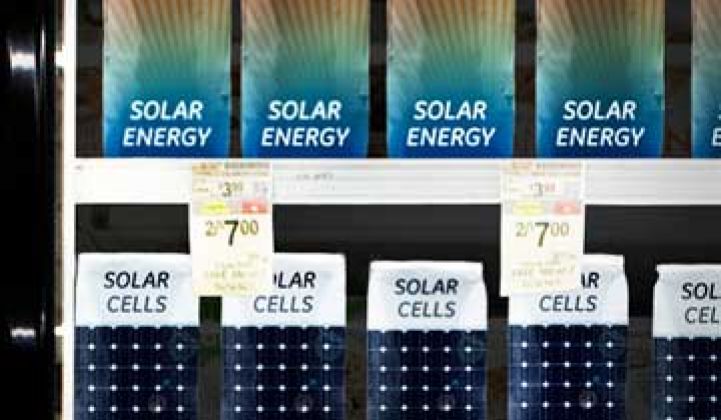Just like bank offers of years ago, retailers in deregulated electricity markets might offer small incentives if you switch to their services. With banks, opening an account might have gotten you free checking for a year and a toaster oven. In Texas, which is the most competitive electric market in the U.S., there is only slight variation in price and generation options with electricity retailers, and instead of a toaster oven, you might get a gift card.
Over in the U.K., however, things are a little different. M&S Energy offers up £30 in vouchers if you save 10 percent on your electricity bill. What does the M&S stand for? Well, that’s Marks and Spencer, one of the U.K.’s leading department store chains.
Technically, Marks and Spencer isn’t in the electric retail business, but it’s selling electricity, solar panels and efficiency programs by partnering with Scottish and Southern Energy. Most of us don’t think twice about buying our electricity from “the” utility, but that could be changing soon. The M&S model could work in the U.S. because Marks is promoting services for SSE. It has retail and customer expertise, however, that SSE doesn't.
Marks and Spencer’s has a wealth of analytical software and data to make the customer experience more pleasant and the sales process more “sticky.” One major problem that utilities and retailers have is trust. Customers simply don’t trust their energy provider the way they trust their favorite large store.
In Australia, where the customer turnover rate is approximately 20 percent, retailers are digging for ways to keep customers around. Origin Energy, one of the nation’s largest retailers, will start offering a customer portal for people to track their usage -- a service badly needed in a country where utility bills go out quarterly. Although Origin is not partnered with a large store, it is one of Australia’s largest suppliers of solar panels. As the market matures, it could find that partnerships offer even more ways to gain, and keep, customers.
Although Home Depot and Lowe’s aren’t selling electricity in the U.S., Costco and Amazon are already selling solar panels. Best Buy is selling electric bikes, and could likely be selling home energy management systems and electric vehicle charging stations as early as this year. Electric vehicles could come later. The next logical step is to sell services -- maybe even electricity the way M&S does -- on top of those products.
Electricity retailers could also partner up with telecoms to offer bundled services. It’s already happening in a few small markets in Australia and the U.S. As the utility industry shifts away from just regulated electricity delivery, companies are finding ways to stay competitive. As for those that don’t find new partnerships and revenue models -- many experts say they could perish.
In the U.S., however, the retail markets are still fairly young and inactive compared to the U.K., Australia or most of Europe. While Best Buy might someday partner with a big retailer, it won’t be coming to stores in the near term. In Texas, competitive suppliers make up nearly 60 percent of the electricity sales, but in states such as Illinois, only 1,188 out of 3.5 million customers have shopped around. Consumers in the 14 deregulated states often aren’t even aware they can choose their retailer and there is limited marketing to make them more aware of their options.
Marketing, however, could be one more advantage of partnering with a well-known store in the future. While utilities know how to deliver power safely, stores know how to build ads towards various demographics and play in a competitive marketplace. For stores that have offerings -- whether it’s energy-efficient appliances or other home goods -- that they want to gain market share on, partnering with an energy retailer could help secure a stream of loyal customers that want one-stop shopping. Would you shop for electricity through a traditional retailer if you could?
Read more on this topic in a joint effort by General Electric Ecomagination and Greentech Media, and join in on the conversation here.



